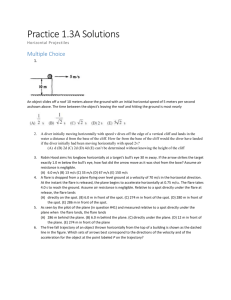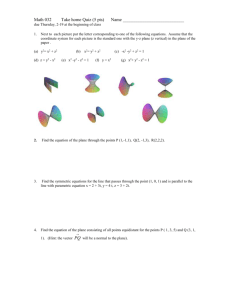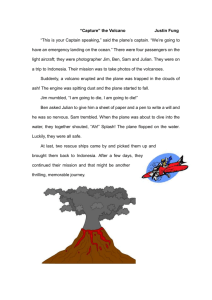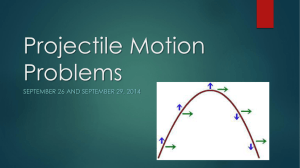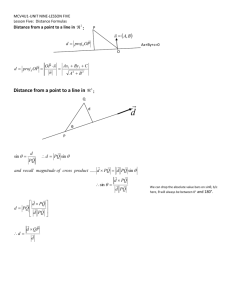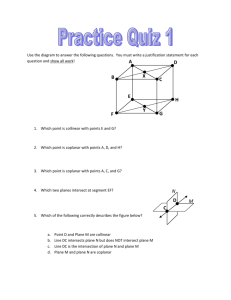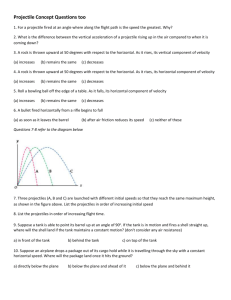File
advertisement
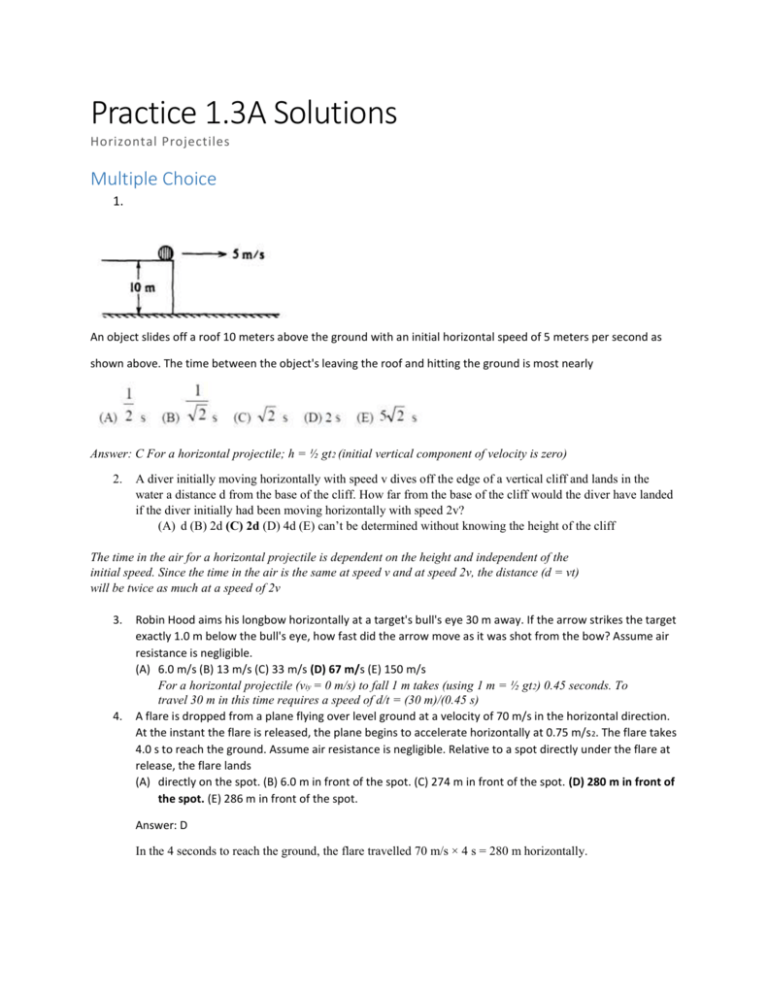
Practice 1.3A Solutions Horizontal Projectiles Multiple Choice 1. An object slides off a roof 10 meters above the ground with an initial horizontal speed of 5 meters per second as shown above. The time between the object's leaving the roof and hitting the ground is most nearly Answer: C For a horizontal projectile; h = ½ gt2 (initial vertical component of velocity is zero) 2. A diver initially moving horizontally with speed v dives off the edge of a vertical cliff and lands in the water a distance d from the base of the cliff. How far from the base of the cliff would the diver have landed if the diver initially had been moving horizontally with speed 2v? (A) d (B) 2d (C) 2d (D) 4d (E) can’t be determined without knowing the height of the cliff The time in the air for a horizontal projectile is dependent on the height and independent of the initial speed. Since the time in the air is the same at speed v and at speed 2v, the distance (d = vt) will be twice as much at a speed of 2v 3. 4. Robin Hood aims his longbow horizontally at a target's bull's eye 30 m away. If the arrow strikes the target exactly 1.0 m below the bull's eye, how fast did the arrow move as it was shot from the bow? Assume air resistance is negligible. (A) 6.0 m/s (B) 13 m/s (C) 33 m/s (D) 67 m/s (E) 150 m/s For a horizontal projectile (viy = 0 m/s) to fall 1 m takes (using 1 m = ½ gt2) 0.45 seconds. To travel 30 m in this time requires a speed of d/t = (30 m)/(0.45 s) A flare is dropped from a plane flying over level ground at a velocity of 70 m/s in the horizontal direction. At the instant the flare is released, the plane begins to accelerate horizontally at 0.75 m/s 2. The flare takes 4.0 s to reach the ground. Assume air resistance is negligible. Relative to a spot directly under the flare at release, the flare lands (A) directly on the spot. (B) 6.0 m in front of the spot. (C) 274 m in front of the spot. (D) 280 m in front of the spot. (E) 286 m in front of the spot. Answer: D In the 4 seconds to reach the ground, the flare travelled 70 m/s × 4 s = 280 m horizontally. 5. As seen by the pilot of the plane (in question #41) and measured relative to a spot directly under the plane when the flare lands, the flare lands (A) 286 m behind the plane. (B) 6.0 m behind the plane. (C) directly under the plane. (D) 12 m in front of the plane. (E) 274 m in front of the plane In the 4 seconds to reach the ground, the flare travelled 70 m/s × 4 s = 280 m horizontally. The plane travelled d = vit + ½ at2 = (70 m/s)(4 s) + (0.5)(0.75 m/s2)(4 s) = 280 m + 6 m, or 6 m ahead of the flare. The free fall trajectory of an object thrown horizontally from the top of a building is shown as the dashed line in the figure. Which sets of arrows best correspond to the directions of the velocity and of the acceleration for the object at the point labeled P on the trajectory? 2 6. Answer: A Velocity is pointing tangent to the path, acceleration (gravity) is downward. During a recent winter storm, bales of hay had to be dropped from an airplane to a herd of cattle below. Assume the airplane flew horizontally at an altitude of 180 m with a constant velocity of 50 m/s and dropped one bale of hay every two seconds. It is reasonable to assume that air resistance will be negligible for this situation. 7. As the bales are falling through the air, what will happen to their distance of separation? (A) the distance of separation will increase (B) the distance of separation will decrease (C) the distance of separation will remain constant (D) the distance of separation will depend on the mass of the bales (E) none of the above are always true As the first bales dropped will always be traveling faster than the later bales, their relative velocity will cause their separation to always increase. 8. About how far apart from each other will the bales land on the ground? (A) 9000 m (B) 300 m (C) 180 m (D) 100 m (E) 50 m Horizontally, the bales will all travel at the speed of the plane, as gravity will not affect their horizontal motion. D = vt = (50 m/s)(2 seconds apart) Free Response Problem 1 A golfer practicing on a range with an elevated tee 4.9 m above the fairway is able to strike a ball so that it leaves the club with a horizontal velocity of 20 m s–1. (Assume the acceleration due to gravity is 9.80 m s–2, and the effects of air resistance may be ignored unless otherwise stated.) a) b) c) d) e) How long after the ball leaves the club will it land on the fairway? What horizontal distance will the ball travel before striking the fairway? What is the acceleration of the ball 0.5 s after being hit? Calculate the speed of the ball 0.80 s after it leaves the club. With what speed will the ball strike the ground? Problem 2 Solution Problem 2 An emergency relief plane is dropping a care package from a plane to a group of medical personnel working for a relief agency in an African village. The package is designed to land in a small lake, inflate an attached raft upon impact, and finally resurface with the raft side down. The plane will be moving horizontally with a ground speed of 59.1 m/s. The package will be dropped a horizontal distance of 521 m from the intended target location. At what altitude above the pond must the plane be flying in order to successfully accomplish this feat? (381 m)
